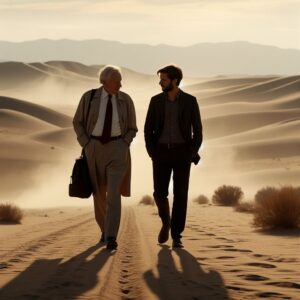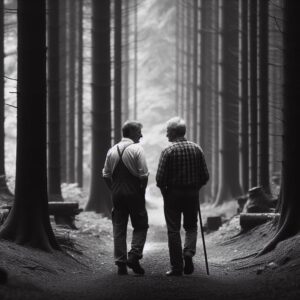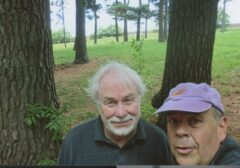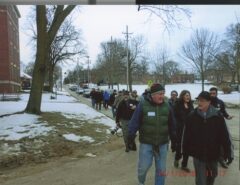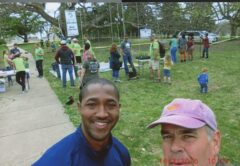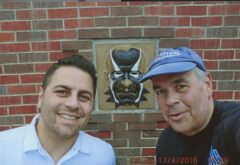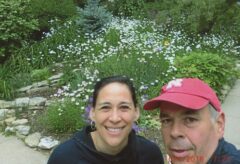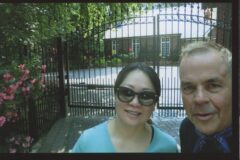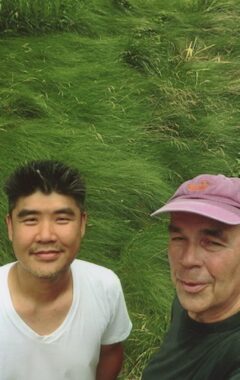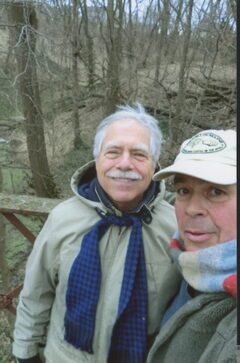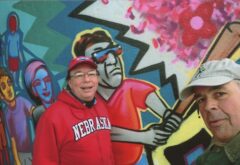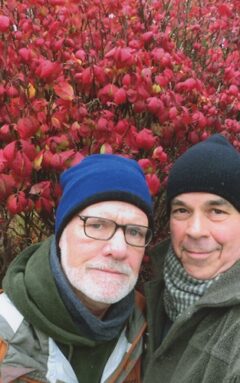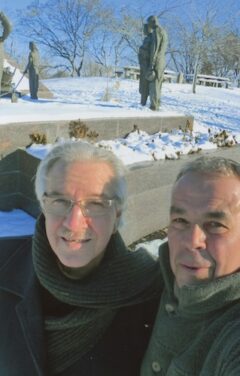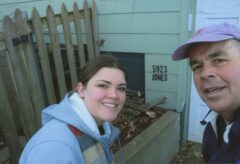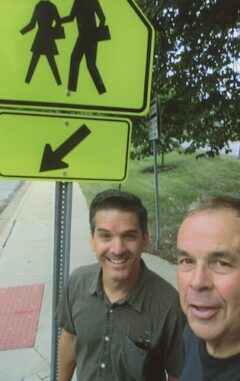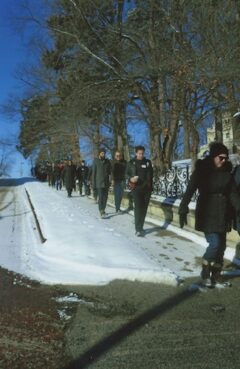The Walking Initiative: Ward Peters
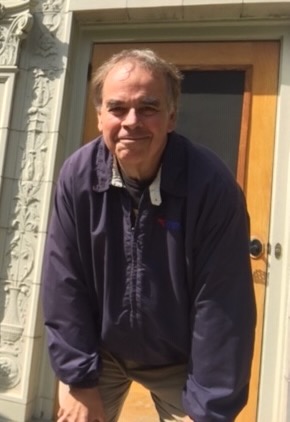
Ward Peters is a life-long resident of Omaha, Nebraska. He was born in Omaha, educated in Omaha, and though he travels widely, he relishes returning home. His early career was in real estate. He was a founding partner of what became a successful real estate company and because of his company’s success, he was able to retire early.
A skillful life coach
Following his retirement, Ward steeped himself in the 18-month training program developed by author and life coach, Maria Nemeth. Dr. Nemeth’s training program gives trainees the skills they need to serve as life coaches. For five years Ward applied those skills, helping over one hundred clients clarify their values and pursue their goals.
Life coaching is meaningful and rewarding work, but it is also demanding work. After five years, Ward elected to closed up shop, facing once again the question: What now?
The Walking Initiative
Ask Ward what he loves to do and you will hear the following: spending time with Jean Ann, traveling to Maine and returning home, yard work, beautifying the common areas in the neighborhood, GOING FOR LONG WALKS.
This would be his next project: The Walking Initiative…

Within weeks of starting, an article in the local paper talked about the Walking Initiative. Call Ward and he will meet you for a sixty-to-ninety-minute walk through the neighborhoods and parks of the city.
This was not life coaching. This was walking side-by-side with another person, a conversation in the out-of-doors. Ward and his walking partner learn about one another’s history, what each is doing currently, their plans for the future. A lot of understanding and trust develops in a ninety-minute walk if you are truly interested in the person beside you.
The Walking Initiative began in 2014. In that year, Ward walked with 30 individuals. In 2015, he walked with 60 individuals, in 2016, 92 individuals, and in 2017 and 2018, over 100 individuals in both years. With many, he walked more than once.
Community building
I should mention that another of Ward’s pleasures is networking. As a result of growing up in Omaha and as a result of being a businessman in the community, Ward had a large network of friends and acquaintances. The Walking Initiative expanded his network further. I was at a gathering where the person standing next to me said: “Oh, there’s Ward Peters.” “You know Ward?” I asked. “Yes, he put me in touch with so and so. That’s how I got my job.”
At the end of every walk, there was picture-taking, “ussies” (as opposed to selfies) with a backdrop to mark the location. At the end of the year, a gathering of all the individuals with whom he had walked plus their spouses/life partners. This gathering included a group walk, a drawing for door prizes, brief remarks by Ward about what a wonderful year it had been, and a massive potluck feast. The latter thanks to Ward’s wife, Jean Ann, and the group of friends who assisted her.

The Walking Initiative was a deceptively simple project; and yet, a wonderfully creative form of community development. How could you not admire it?
Walking and listening
So, the Walking Initiative was about walking, about getting to know another person, about developing a meaningful dialogue. And it was about the networking that is then possible. But it was also about something else. It was about listening and about the experience and benefit of being heard.
Perhaps the following two examples can help illustrate the value of this aspect of the initiative.
Ocoee Miller, a long time friend, gave me permission to share the following: Ocoee needed to attend a conference two hundred miles from her home. Since she did not want to go alone, she put an ad in the local paper asking for anyone who might be willing to drive with her and share the expense. She got only one response. It was from a woman well known for being among the most disagreeable, agitated, hard to get-along-with individuals in the community.
Ocoee said she hesitated but only for a moment. She decided she would go as planned, sharing the trip with the one person who answered the ad. However, she wanted one requirement. When they met, Ocoee suggested the following: If you’ll agree, I would like to do the driving. While I drive, I would like for you to tell me the story of your life. Start back as far as you like. Don’t leave anything out. Include everything that is important. I may interrupt but only to make sure I have things straight, the relationships, the key actors, etc. I would love for us to spend our time together in that way.

And that’s what they did, all the way to the conference and back.
By the time the trip was over, Ocoee told me that she had never felt so much compassion for any one person in her life. And the woman? The agitation was gone. Her face softer, relaxed.
The second example comes from journalist, Dahr Jamail, author of The End of Ice: Bearing Witness and Finding Meaning in the Path of Climate Disruption. Jamail’s conclusion, based on his observation of the melting of glaciers and icecaps is that humanity is in denial. The Earth’s climate is becoming increasingly hostile to life and at a rate far more rapid than expected.
In a documentary entitled, Living in a Time of Dying, Jamail is asked: What do we do now, now that so much dismantling of life as we have known it is in the offing? “Now more than ever,” Jamail replied, “we must listen.” We must go out in nature and, as he put it, listen to the Earth, listen, as well, to the indigenous cultures that have always emphasized listening. If we do this, he suggested, really do it, carefully, fully, then “what is ours to do will come to us.”
The Holy Land
If you Google “famous people who have walked” you discover that the composer Pyotr Tchaikovsky walked in order to stay healthy. Charles Dickens walked to relieve anxiety. Steve Jobs walked to “engage in deep conversations with one other person, free of office distractions”. Einstein walked “to work out complex problems in his head” and Nietzsche walked because “all truly great thoughts are conceived by walking.” For Thoreau, every walk was a crusade… a way of going to the Holy Land (Walking by H. D. Thoreau).
The Walking/Listening Initiative offered various benefits, each to varying degrees: stress-reduction, dialogue, networking, the discovery, perhaps, of what is yours to do.
Honoring the muse

It’s on this last possible benefit that I want to linger.
If what is yours to do comes to you, then in my opinion you must do your best to do it (providing you are not hearing voices!). If “what is yours to do” calls to you, if it seems utterly right and consistent with your values, then, yes, you must do it. Check with your spouse, of course, but do it.
Among the many “goods” that may come from it is this: Through your efforts to do what is yours to do, faithfully, creatively, you will be making room in yourself for still larger ideas to appear, room for larger motives to operate. Ignore the muse and she will ignore you. Honor her by acting on her request and she will return, a request of still greater beauty or importance in hand.
I thought the Walking Initiative was brilliant. And lovely. And ancient. Two people walking side by side through desert, forest, cityscape. It doesn’t matter. Eventually, they find themselves entertaining questions of meaning and then, perhaps, insight and clarity on what to do next.
————————
A small sampling of the people who walked with Ward during the course of his Walking Initiative.
Gallery
Ward Peters can be reached at wdpjab@cox.net.
David Thomas, PhD


